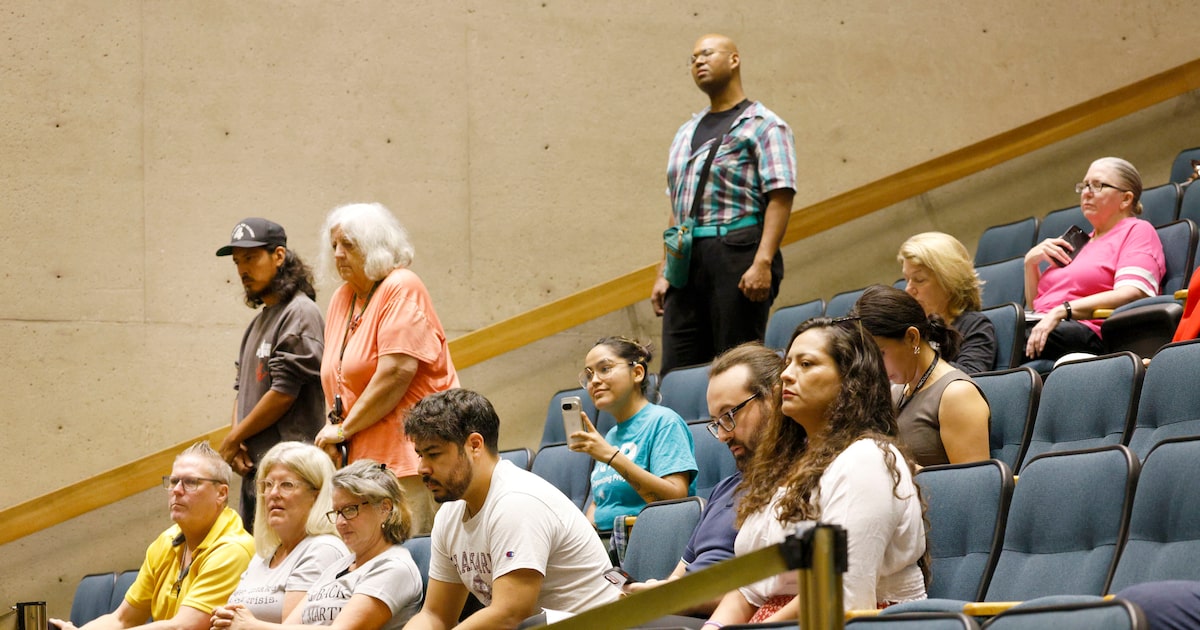The Dallas Community Police Oversight Board wants answers from Chief Daniel Comeaux about how the department is cooperating with the U.S. Immigration and Customs Enforcement.
On Tuesday evening, the board agreed to ask Comeaux to join their next meeting and answer the community’s and the board’s questions.
Related:City attorneys bar Dallas police chief from speaking about immigration
Around 40 people showed up to the meeting to push the board to engage the Dallas Police Department. Community members said they want Dallas police to prohibit voluntary cooperation with ICE without a judicial warrant, require quarterly public reports on interactions with ICE, ensure immediate notification of family members when someone is detained and issue a public statement from Dallas police leadership stating that they do not collaborate with federal agents.
Breaking News
“We can’t stop ICE from existing. What can we do? We can pass a strong city ordinance,” Azael Alvarez said. “This isn’t about politics. It’s about trust. No one should be afraid to call 911.”
Residents made similar demands at a City Council briefing last week.
Also Tuesday, U.S. Rep. Julie Johnson, D-Farmers Branch sent Comeaux a letter asking for a detailed explanation of the DPD’s current policy regarding its cooperation with ICE.
She asked whether the department has agreements with ICE, has received funding, equipment, or resources from ICE or the U.S. Department of Homeland Security, and if DPD officers are ever stationed or assigned to work with ICE officers.
Johnson requested a written response by Aug. 21. Corbin Rubinson, a DPD spokesperson, said the department received the letter and will respond.
Multiple board members Tuesday said residents are afraid and want answers, and the board’s job was to ask questions, even if the chief or the city attorneys don’t want to answer.
“School is starting back, and children are going to school, and there will be situations where babies come home and their parents aren’t there,” said Jonathan Maples, District 2 board member. “We cannot be afraid to have to ask hard questions, and those who are in leadership positions can’t be afraid to answer those questions.”
Comeaux, months into his tenure as the police chief, has been asked several times if the police department is helping ICE agents in a variety of circumstances.
He has routinely said the department will help federal partners “whenever help is needed or requested.” Nearly two months ago, during the last Community Police Oversight Board meeting, city attorneys ran interference when board members began asking Comeaux similar questions.
At the time, an assistant city attorney said the meeting was only for introductory questions and any questions about immigration policy were beyond the scope. That did not sit well with several board members, who said they had sent the police chief detailed questions prior to the meeting.
The Dallas Police Department’s current policies bar officers from stopping or contacting anyone solely to determine their immigration status. Officers can only ask people who are lawfully detained or arrested about their immigration status.
Local law enforcement can arrest undocumented migrants through Section 287(g), a national program that deputizes local officers to assist ICE and carry out a limited number of immigration enforcement actions. Participation is currently voluntary in Texas. At least 51 law enforcement agencies in the state are enrolled.
Related:ICE held migrants at Dallas office for days, families say, exceeding agency standards
But Dallas police officials have not yet announced any plans to participate in the program.
Taylor Jones, another speaker Tuesday, said she witnessed immigrants being detained and poorly treated at the federal courthouse in downtown Dallas.
“When people see brutality instead of fairness, they stop trusting the law. They stop calling the police, reporting crimes and serving as witnesses,” Jones said. “You have a choice: be the wolf or be the shepherd. Pretend you don’t hear their cries or protect them.”
